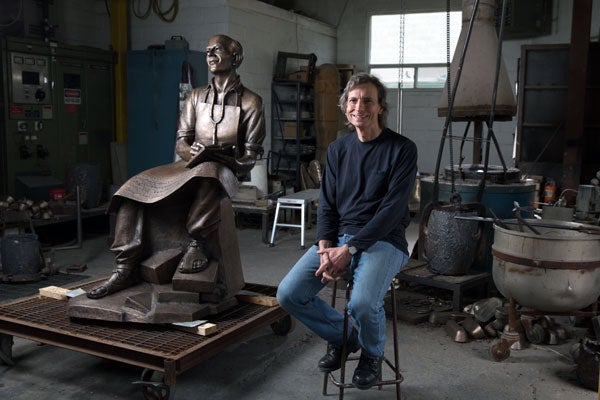
Sculpture to show intimate side of Norman Bethune
Published: May 26, 2014
When Norman Bethune died of septicemia in a Chinese mountain village in 1939, there was no way he could have known that his work would be celebrated 75 years later, not only in China but in Canada as well.
Today, he’s remembered as an inventive battlefield surgeon and an internationalist who helped to create strong and lasting ties between China and Canada.
The University of Toronto’s Faculty of Medicine is commemorating the anniversary with a bronze sculpture to be unveiled May 30, which reaches back to Bethune’s student days for a new interpretation of the legendary surgeon as thoughtful and very human.
“Statues of Bethune are usually heroic and strident,” said artist David Pellettier, who was chosen to create the sculpture. “I wanted this interpretation to be more contemplative and approachable.”
Chinese philanthropists Zhang Bin and Niu Gensheng contributed $800,000 to create the life-sized work and support for new medical student awards and bursaries in Bethune’s name. The unveiling will be followed by a gala dinner Saturday evening, part of the Faculty of Medicine’s Bethune Legacy Celebration, which recognizes his international impact on health and the Faculty’s associations with China.
“The statue will commemorate Dr. Norman Bethune, one of our most celebrated medical alumni. The gala is an opportunity for us to recognize both the donors and Bethune’s legacy, whose contributions will continue to inspire many generations,” said Catharine Whiteside, dean of the Faculty of Medicine.
To arrive at a fresh presentation of the military surgeon and inventor, Pellettier read Bethune biographies and combed through photographs from the two years he spent in China at the end of his life. He was astonished by the images of Bethune, at age 49, broken by the deprivations of war, looking like a man in his 70s. He began to imagine Bethune as physician and humanitarian.
Then Pellettier started thinking about the setting of the planned statue – not in China, but in a triangle of grass surrounded by trees at U of T, where the Gravenhurst, Ont. native completed his medical degree in 1916. A spot where Bethune likely would have walked, and perhaps paused in contemplation.
He realized there was a chance to tell a more intimate story about the man who brought modern medicine to rural China, to view his heroism through the lens of a deeper humanity, and perhaps through the idealism of youth.
“I wanted to reflect back on his connection to U of T as a student, so I pictured him there, casting back to his accomplishments, working in such difficult situations,” said Pellettier, who recently completed the ferry terminal statue of late NDP leader Jack Layton. “Here he is in his surgeon’s gown, with his stethoscope, and the Chinese sandals he chose to wear. He’s glancing up from his journal, in a moment of reflection.”
The sculpture is inscribed with words adopted from Bethune’s writings:
“… I am content. I am doing what I want to do. Why shouldn’t I be happy – see what my riches consist of. First I have important work that fully occupies every minute of my time… I am needed."
Heidi Singer is a writer with the Faculty of Medicine at the University of Toronto.



